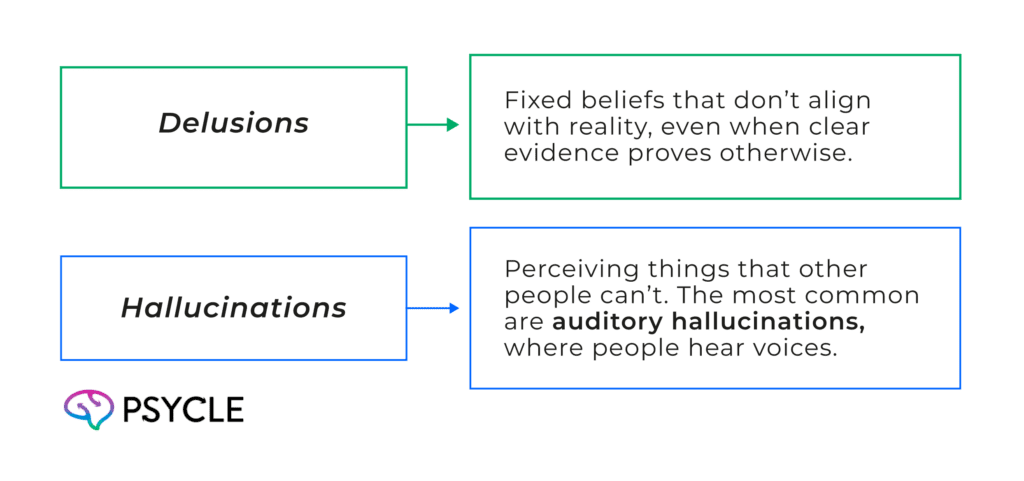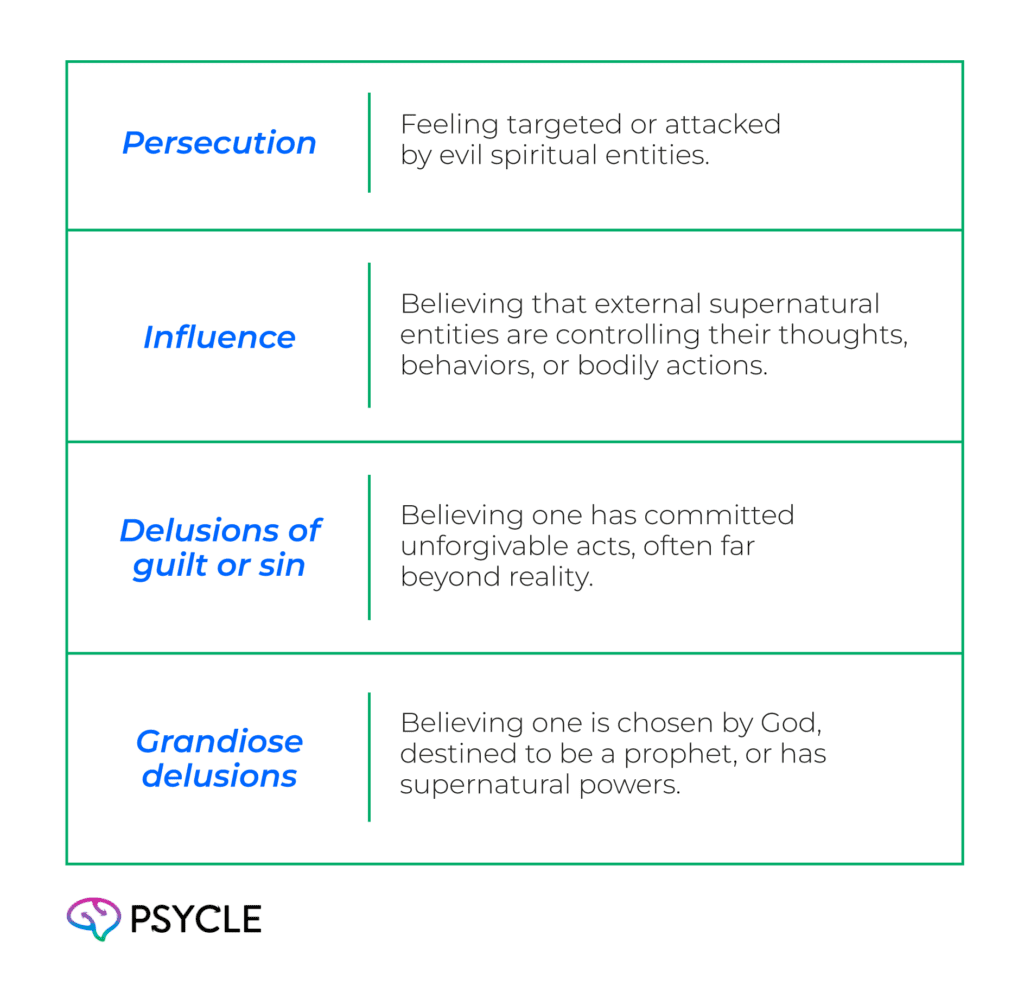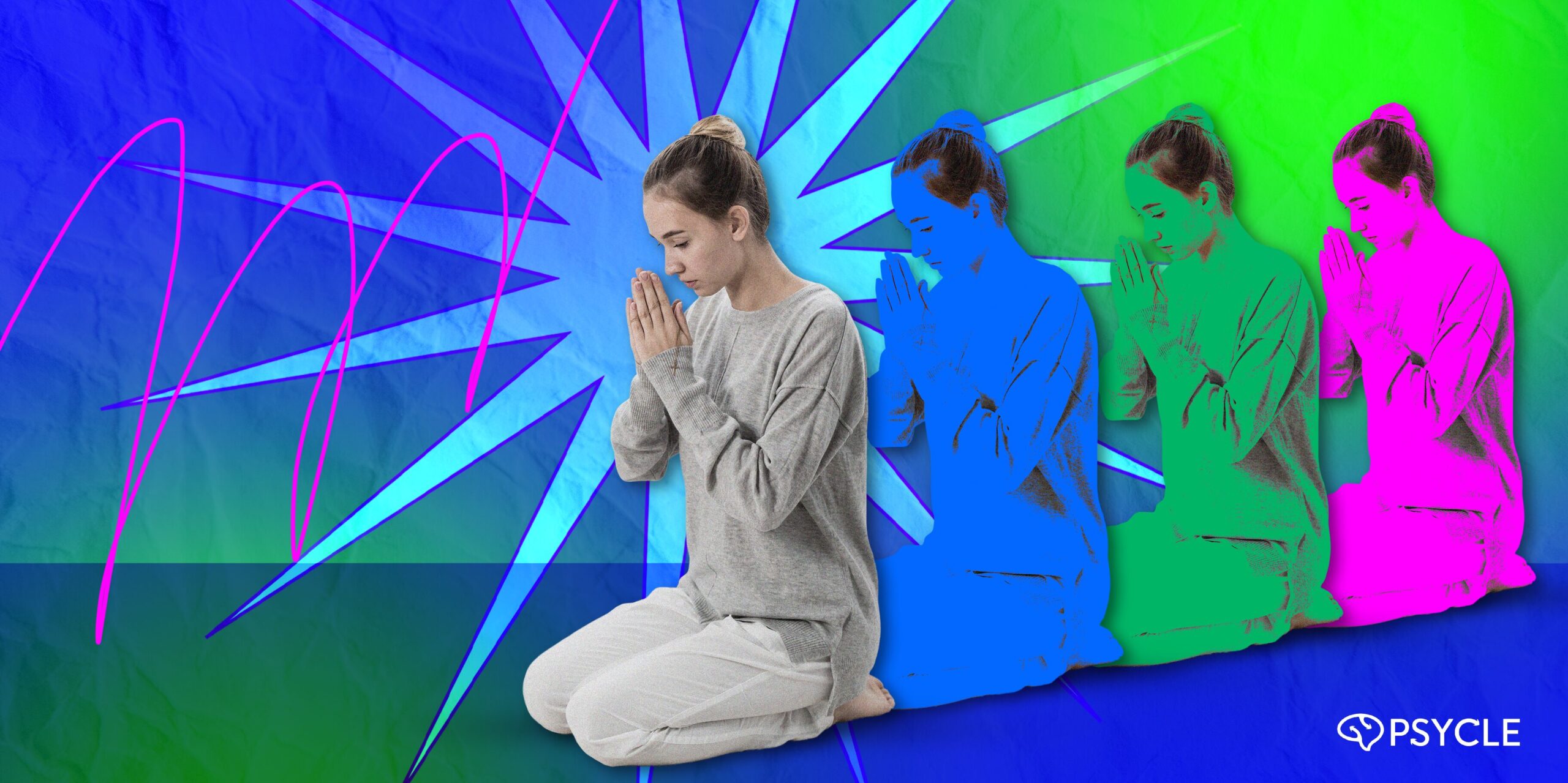Religion has always played a central role in how people understand suffering, healing, and the human mind. For many, faith provides comfort, purpose, and a sense of belonging. But in some cases, it can take on a darker, more troubling dimension.
Religious delusions can include things like visions of God or the Devil and fear of being bewitched by mystical forces. It often occurs in schizophrenia and can severely impact the well-being, relationships, and daily life of those affected.
In this article, we’ll explore religious psychosis, looking at some common delusions associated with different spiritual beliefs. We’ll also look at how religion can have both a positive and a negative impact on people with schizophrenia.
Key Takeaways
- Religious psychosis occurs when delusions or hallucinations take on spiritual or supernatural themes, such as possession, visions, or messages from God.
- Common themes include persecution, influence, guilt, sin, and grandiose beliefs (exaggerated sense of importance or divine purpose).
- Cultural context matters: What is considered psychotic in one culture may be a normal mystical experience in another, making diagnosis complex.
- Impact on daily life: Religious delusions can delay treatment, worsen symptoms, and interfere with relationships, work, or self-care.
- Balanced approach is key: Faith can be both protective and harmful; respectful, culturally sensitive care that integrates spirituality when appropriate leads to better outcomes.
What Is Religious Psychosis?
Psychosis is a mental state in which a person loses touch with reality. It’s defined by two main features:

Psychosis is most commonly linked to schizophrenia, but it can also appear in other conditions. When psychosis occurs on its own, without other schizophrenic symptoms, it is often diagnosed as brief psychotic disorder or schizoaffective disorder. Psychotic episodes are also seen in bipolar disorder and severe depression, and can arise from substance use or medical conditions that affect the brain.
In many cases, psychotic symptoms take on spiritual or mystical themes. Religious psychosis is when delusions and hallucinations revolve around religious or supernatural content.
Categories of Religious Psychosis
Researchers often distinguish between two main forms:
- Religious Delusions and Hallucinations: These are directly tied to organized religion or specific figures. Examples include:
- Hearing the voice of God commanding actions
- Believing one is possessed by demons
- Feeling immense guilt for imagined sins
- Being convinced that Jesus, the Devil, or a prophet is communicating directly
- Supernatural Delusions and Hallucinations: Less tied to formal religious systems, but rooted in mystical or magical thinking. Examples include:
- Fears of black magic or witchcraft
- Belief in spirits haunting the individual
- Convictions of being bewitched or cursed
- Visions of ghosts, mythical forces, sorcery, or voodoo
Problems Diagnosing Religious Psychosis
Diagnosing religious psychosis can be especially challenging because spiritual experiences are interpreted differently across cultures. In some traditions, phenomena like possession, visions, or talking to God are deeply ingrained and even valued, while in others they may be seen as unusual or pathological.
This means distinguishing between a mystical experience and a psychotic symptom can be highly subjective.
A key sign that religious beliefs are part of psychosis is when they occur alongside other mental health symptoms, or when the beliefs themselves cause significant distress and interfere with daily life.
Common Religious Delusions in Schizophrenia
Across studies, certain themes consistently appear in the religious delusions of people with schizophrenia:

These delusions can be highly distressing, leading to isolation, fear, or even dangerous behavior if individuals act upon them.
On a Reddit thread, one user shared their experience of having religious delusions from a young age:
“I was non-stop paranoid. Believing in the supernatural in general gave me problems with God, the afterlife, demons, monsters, spirits, etc. I was anxious all the time because I thought I was constantly being watched, judged, that my impulsive thoughts could influence God’s decisions (and therefore the future), that monsters watched me, and that evil spirits lived in my mirrors.”
Are Some Religions More Prone to Religious Delusions?
Certain spiritual beliefs may be more associated with religious delusions and other schizophrenic symptoms than others. Research suggests that Christian patients are more likely to develop religious delusions, especially those focused on guilt and sin.
Among the different types, Roman Catholic patients reported higher rates of guilt-related delusions compared to Protestants in one study. This finding may reflect Catholic teachings that emphasize confession, penance, and sin.
Compared to Christians and Muslims, research shows Buddhists have the lowest frequency of religious-themed delusions.
Does Religious Belief Increase the Risk of Schizophrenia?
One of the most debated questions in psychiatry is whether religiosity increases vulnerability to schizophrenia.
In a review of 70 studies, about 43% reported a link between religious or supernatural beliefs and psychosis, showing there are mixed results.
Faith can reinforce delusional thinking and may increase the severity of symptoms. For instance, if someone believes in possession, they may interpret hallucinations through that lens. People may also be less inclined to seek psychiatric help, instead turning to spiritual or magic healers.
On the other hand, religion can also serve as a protective factor for schizophrenia. Religious communities can provide a sense of belonging and help reduce isolation. Faith also gives people a sense of purpose and hope, helping improve overall well-being and motivation to get better.
How to Help Someone with Religious Delusions
Helping someone with religious psychosis requires sensitivity, understanding, and respect. Simply telling them their spiritual experiences are “false” can be dismissive, undermine trust, and even worsen their symptoms.
If You’re Concerned About a Loved One:
- Respect their cultural and religious background: Avoid judgment and listen openly to their experiences
- Seek guidance from trusted community members or family: Speaking with people who share the same spiritual or cultural framework can help provide perspective and support
- Encourage professional help: Mental health professionals can evaluate whether the experiences are part of psychosis and recommend appropriate care. Clinicians may also integrate the person’s faith into treatment plans if appropriate
The goal is to balance respect for belief with evidence-based treatment, ensuring the person feels supported while addressing distressing or disruptive symptoms.
FAQs
Can Religious Beliefs Cause Schizophrenia?
Religion itself does not cause schizophrenia. However, spiritual or religious beliefs can shape the content of psychotic symptoms and influence how the illness is experienced and managed.
How Can I Tell if Someone’s Religious Experience is Psychotic or Just a Spiritual Belief?
It can be difficult, as mystical experiences are normal in many cultures. Signs of psychosis include distress, disorganization, hallucinations, or delusions that interfere with daily life. Grandiose beliefs (e.g., thinking one is a prophet or divinely chosen) combined with other schizophrenia symptoms may indicate religious psychosis.

